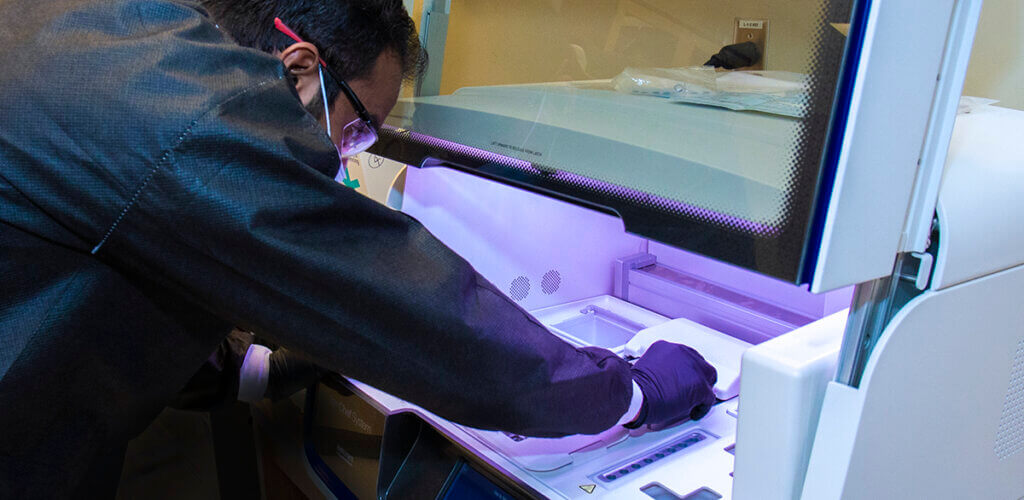
The dedicated work of the Animal Disease Diagnostic Laboratory team at Purdue University took on an added dimension of importance in 2020 as the facility performed the necessary validation work to start testing human samples for COVID-19 in support of the Protect Purdue initiative. The ADDL’s role grew even more significant this year as the University sought help identifying COVID-19 variants.
“Sequencing to detect variants was originally started at Purdue in the early spring of 2021,” explained Dr. Rebecca Wilkes, associate professor of molecular diagnostics in the College of Veterinary Medicine’s Department of Comparative Pathobiology and head of the ADDL Molecular and Virology Sections. Dr. Wilkes said they started noticing telltale “S drop-outs” in their polymerase chain reaction (PCR) tests on the COVID-19 samples and were aware that this could be associated with the Alpha variant. Since another Purdue faculty member’s lab across campus already was set-up to do the necessary sequencing and could get results quickly, the ADDL sent the samples there to determine the presence of the variant.
Dr. Wilkes explains that to date, all the sequencing has been performed for surveillance purposes to detect the presence of a variant, but not to manage patient care. Because of that, the sequencing does not have to be performed in a lab that has Clinical Laboratory Improvement Amendments (CLIA) certification, something the other lab lacks. The ADDL, however, is CLIA certified, because it had to complete the arduous process of obtaining the certification before it could start conducting PCR tests on human COVID-19 samples in 2020.
There has been interest in having the ADDL perform the sequencing because of its CLIA certification, in case sequencing is ever needed for patient management. “Say, for example, if the virus changes to a point that it affects whether certain treatments would become ineffective, that would be important for medical professionals to know from a case-management standpoint,” explained Dr. Wilkes.
She also notes that the ADDL has a different sequencing instrument than the one used in the other Purdue lab, so the ADDL has to use a different protocol to conduct the sequencing. Coincidentally, the Purdue faculty member who ran the other lab left the University in the meantime. “We verified the protocol in our laboratory during the summer of 2021,” Dr. Wilkes said. “Our protocol and plan validation work was approved by our CLIA medical director on August 24 and we started sequencing samples immediately after that.”
The Protect Purdue Heath Center (PPHC) has been targeting positives for sequencing from individuals who have been fully vaccinated, but are showing clinical symptoms, Dr. Wilkes explains. “These have been the vast majority of our samples for sequencing. Additionally, PPHC is sending positives from individuals with a history of travel, despite vaccination status. So far, we have sequenced more than 500 samples, and we are sequencing more samples each week.”
Dr. Wilkes has a postdoctoral research associate, Dr. Jobin Kattoor, who is performing the bench work and then Dr. Wilkes does all the analysis. She says initially, nearly all the samples were the Delta variant (that includes B.1.617.2 and AY lineages), but the Omicron variant has rapidly taken over Delta as the main circulating variant. Omicron currently makes up approximately 95% of the sequenced variants in the US, as reported by the Centers for Disease Control and Prevention (CDC) on January 1, 2022. “We already have sequenced over 100 omicron samples now to confirm this variant on campus,” Dr. Wilkes said. “Cases are rising on campus directly as a result of this variant.” According to a statement on the Centers for Disease Control and Prevention website, “Current vaccines are expected to protect against severe illness, hospitalizations, and deaths due to infection with the Omicron variant. However, breakthrough infections in people who are fully vaccinated are likely to occur.” Dr. Wilkes says many infections have been confirmed in vaccinated individuals, but the vast majority of the cases have been mild.
“All of this effort and the expertise required to carefully and accurately carry out this testing and sequencing highlights the value of the ADDL to Purdue University and the State of Indiana,” said ADDL Director Kenitra Hendrix. “While our primary mission and first priority remains diagnostic support of animal health and the safety of the food supply, we appreciate this unique opportunity to assist with COVID-19 testing, as well as sequencing to identify variants, given our special expertise and capabilities that we customarily use in infectious disease testing and immunity surveillance for animals across Indiana. It is rewarding to have been able to take on this role in support of Purdue University and our state.”

